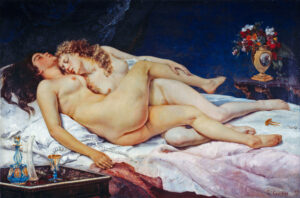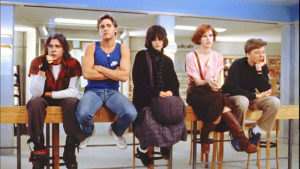I remember the first time I heard The Lexicon of Love. Aged 22 in a no-horse town, more terrified by the day that I had made a mistake in marrying the first man I had sex with, I couldn’t stand to hear “The Look of Love” and “Poison Arrow” on the radio, turning them off quickly lest my treacherous mind be read. That’s what the best love songs do — make us feel that, though they’ll be listened to by heartsore hordes, they’re speaking just to us.
Do they still? Next month’s belated 40th anniversary reissue of ABC’s legendary debut will be marked with — deep breath — the album performed live at Hammersmith Odeon, numerous remixes, a disc featuring Mantrap, the group’s 55-minute espionage thriller directed by Julien Temple, and an essay by lead singer Martin Fry. For once, the hoo-ha seems reasonable. Entering the album chart at number one, the record featured three classic top 10 singles and remained on the charts for 50 weeks.
Yet for all the Lexicon‘s success, it’s hard not to conclude that the love song has since become the exception rather than the rule. Was it a case of the singer, not the song? Did Fry’s voice give a depth to his creations that might otherwise not have been there? Hardly: the song-cycle was so spectacular that its success happened despite, rather than because, of the magic pipes of the warbler. Fry was a profoundly humdrum vocalist, a phenomena that affected many of the biggest bands of the time, including Duran Duran and Spandau Ballet, whose Simon Le Bon and Tony Hadley both often sounded as though they had a crucial body part trapped in a door.
The death of the love song is often attributed to that old, shag-shy stalwart: the end of innocence. When sex got slammed on the table, love, and all the yearning metaphors that fuelled the great love songs, went out through the window. But love wasn’t murdered by sex; after all, Mick Jagger and David Bowie were both slappers who wrote many great love songs. I’d also wager that Adele and Ed Sheeran have put it about a lot less than most people, definitely less than most pop stars, but their love songs are the aural equivalent of that tinned gunk designed to nourish invalids. Like great political leaders, then, great love songs can’t be conjured up by monogamy or banished by promiscuity. Neither can “commercialism” be blamed, as if the great love songs were written in some Arcadian glade. On the contrary, many came from songwriting industrial complexes, from Tin Pan Alley to the Brill Building.
Instead, much of the blame can be placed on the atomisation of society. Great songs — love, and otherwise — require an oceanic element, a single story that millions can relate to. When I was a teenager, we would congregate in the cloakrooms on a Tuesday lunchtime, literally holding our breath until we found out where our favourite single was in the new Radio 1 top 20. I remember my friend Carol bursting into tears when “The Jean Genie” failed to reach the top spot and having to go home as she couldn’t sufficiently pull herself together to face an afternoon in double physics. Then came Thursday’s Top of the Pops, when you could moon over the latest teen idols singing their love songs, just for you — and, if you were lucky, witness the outrage of your dad as David Bowie cracked on with his guitarist.
It’s not just songs, though; artistic representations of love have generally deteriorated. Is it likely that we’ll ever see a film such as Casablanca or read a book such as The End of the Affair again? Now, even romcoms have been ditched for superhero franchises, while Sally Rooney writes novels which might generically be called “Janet and John Get Naked and Say Stuff about the Pointlessness of Existence”. Love, though always as mysterious as a mermaid, was once as easy to find as chips — but with the endless chatter and clatter of online life, how will we ever stop our trivial amusements long enough to hear the song of the siren? Stop that racket, I’m trying to watch Love Island!
Of course, none of this is helped by the fact that, thanks to social media and therapy culture, we talk about our emotions so much that there’s nothing left for love songs. Consider this lyric from last year, in Cat Burn’s “Ghosting”:
“I always come first, prioritise myself
‘Cause I could lose it all
And fall down a deep hole
I gotta watch my mental health
So I recharge alone
Don’t take it personal
I’m just an introvert
So don’t stress, I’ll be fine
I just need some time.”
This may well be an excellent life lesson — but as a love song, it sucks. And not in a good way.
Though I know what I like when it comes to love songs — “Wouldn’t It Be Nice” by The Beach Boys, “Baby It’s You” by The Shirelles, “Just Like Heaven” by The Cure — others will disagree. So I asked the composer Robin Watt, whose modern showtunes have been compared to those of the American Songbook canon, what he thought the problem is. “Irving Berlin, probably the most successful composer in history, famously played piano with one finger,” he told me. “A lack of musicianship isn’t a bar to composing great love songs. Berlin often broke the rules by having unusual lengths for each section or bunging in an extra bridge. In total contrast, these kids today can’t seem to break out of this dreadful musical rut. The effect is one of permanent suspension in a state of despair, whereas once a melody was about creating and resolving tension. Even uptempo stuff today still has this thread of self-regarding woe to it. The solution would be that composers stop taking themselves so seriously — but, unfortunately, that won’t happen as long as they have all these ‘issues’.”
ABC’s subsequent decline after the splendour of their debut is a microcosm of what has happened to the love song generally over the past four decades. Beauty Stab, their 1983 follow-up, was not just an example of Second Album Syndrome, but a veritable self-immolation; Simon Reynolds called it “one of the great career-sabotage LPs of pop”. Though ABC has staggered on in various incarnations ever since, it quickly went a bit Light Entertainment. In 2005, Fry toured with Tony Hadley, a missed opportunity which, if they’d only included Simon Le Bon, might have been a crooning equivalent of the Three Tenors — the Three Tenners, perhaps, as that’s the absolute most you’d pay to see them.
Haunted by his Citizen Kane, Fry announced in 2015 that his new album would be called The Lexicon of a Lost Ideal, “a take on The Lexicon of Love, but all these years on. I’m a man in my fifties now with a wealth of experience. It’s about how you grow older but you make the same mistakes over and over and over again.” When it was released the following spring, imaginatively re-titled The Lexicon of Love II, it entered the UK album charts at number five, ABC’s highest ranking since the original. It wasn’t a bad record — but there’s a world of difference between not bad and perfection.
Will the love song ever get its mojo back? I really do hope so, even though I personally have heard all the great love songs I can handle. Because only then can we once more go serenely to our favourite pizza parlours without hearing the great love songs of the 20th century slowed down and droned to death by sad young people who know there’s something missing from their own repertoire, but don’t have the lexicon — of love — to put it right.
Disclaimer
Some of the posts we share are controversial and we do not necessarily agree with them in the whole extend. Sometimes we agree with the content or part of it but we do not agree with the narration or language. Nevertheless we find them somehow interesting, valuable and/or informative or we share them, because we strongly believe in freedom of speech, free press and journalism. We strongly encourage you to have a critical approach to all the content, do your own research and analysis to build your own opinion.
We would be glad to have your feedback.
Source: UnHerd Read the original article here: https://unherd.com/




